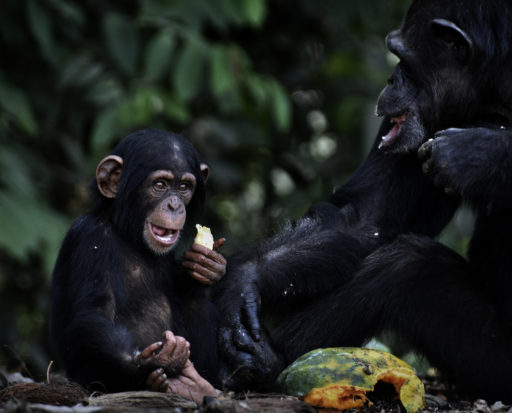Last week, the insurance giant MetLife said it was ending its support for the New York Blood Center until the company resolves its dispute with The HSUS and other groups over the medical charity’s abandonment of more than 60 chimpanzees on a set of remote estuary islands in Liberia. It was just months ago that Citibank, after learning the facts of the case, took a similar action, disassociating itself from NYBC and then donating $50,000 to The HSUS to be used to care for the chimps.
NYBC is a major medical charity, and for more than 30 years it used chimps in experiments to develop a number of vaccines and drugs. More than a decade ago, it stopped the experiments, and it retired the chimps. In 2005, Dr. Fred Prince, speaking on its behalf, said that “NYBC recognizes its responsibility to provide an endowment to fund the Sanctuary for the lifetime care of the chimpanzees.”

When workers approached the islands with food and water, the water-averse chimps waded into the ocean and desperately reached for the nourishment and gulped down cups of water. Photo by Carol Guzy/For The HSUS
That’s why it was a shock to me and others at The HSUS when a National Institutes of Health scientist, responding to a separate public health crisis in Liberia, alerted us and others in March of last year that NYBC had cut off funding for chimp care and effectively left the animals to starve and die of dehydration.
When the NIH scientist alerted us, we responded immediately, making arrangements for food for the free-roaming chimps and fixing the system that provided fresh water for them (the islands on which they live are surrounded by undrinkable brackish water). When the workers approached the islands with fruits and other foods and water, the water-averse chimps waded into the ocean and desperately reached for and grabbed the nourishment and gulped down cups of water.
We’ve been caring for them ever since, at a cost to us of tens of thousands a month. The “Today” show did an extensive piece on the controversy yesterday, but there are other details that did not get reported, and it’s important that they are on the record:
- NYBC made millions from these chimps. NYBC seeks credit for the fact that it cared for these chimps for a few years, but the fact is that they stopped doing so by leaving the animals to starve to death. The cruelty and irresponsibility of such an act is unspeakable, and the fact that they honored their obligation and word before that is certainly no defense or justification.
- NYBC has more than $400 million in assets and $300 million in annual revenue. This is not a struggling charity, and proportionately, this is a minor obligation for the organization. It can certainly pay a few hundred thousand dollars per year to fulfill its responsibility to provide lifetime care for animals it subjected to invasive experiments and years of life in small concrete cages.
- We asked NYBC to help us build a modest facility on the islands to allow health care inspections to be administered safely. NYBC refused.
- Not only did NYBC subject these chimps to invasive experiments and cage confinement for years on end, it obtained them from the disreputable trade in chimpanzees in West Africa. Almost certainly, NYBC bought chimps from hunters. Typically the hunters shoot the mothers and then grab the orphans and sell them to research operations like NYBC, or they are collectibles and a separate profit center for people involved in the bush meat trade.
- During the course of its operations in Liberia, NYBC put more than 400 chimps through invasive experiments. Today only 63 remain, a proportionately modest burden to bear for a company of its size, and one that created the need for this care in the first place.
- A sizable segment of the public may tolerate and accept the use of animals in research, but it expects that the institutions using them will ensure a high degree of care during and after their use. NYBC has broken that compact.
So many of the caretakers of the chimps, many of whom worked for NYBC, despite their own meager living standards and the travails they faced, provided food and water for the animals even after NYBC stopped paying them and until The HSUS stepped in to provide steady support. To think of their sacrifices, and their humane instincts, and to compare them with the actions of the NYBC leadership, is a most unflattering contrast. The HSUS hired a large number of these devoted employees to continue caring for the chimps.
Recently, the NYBC offered very modest annual payments to us for care of the chimps. Those payments would have covered less than five percent of the projected lifetime cost of care for the chimps.
When the NYBC is ready, we’ll entertain a serious offer — one that is commensurate with its original responsibility to deal with a problem of its own making, and consistent with the social contract that surrounds the use of animals in an advanced society. Until then, we’ll not only care for the chimps, but we’ll call out NYBC’s behavior in a public way. Their conduct is not worthy of a medical charity. Medical charities aim to heal and to help, but this action is so inconsistent with the ultimate mission and purpose of an organization designed to save life. It can do better, and it must do better.
The post NYBC anything but a champ for Liberian chimps appeared first on A Humane Nation.
Enviroshop is maintained by dedicated NetSys Interactive Inc. owners & employees who generously contribute their time to maintenance & editing, web design, custom programming, & website hosting for Enviroshop.
